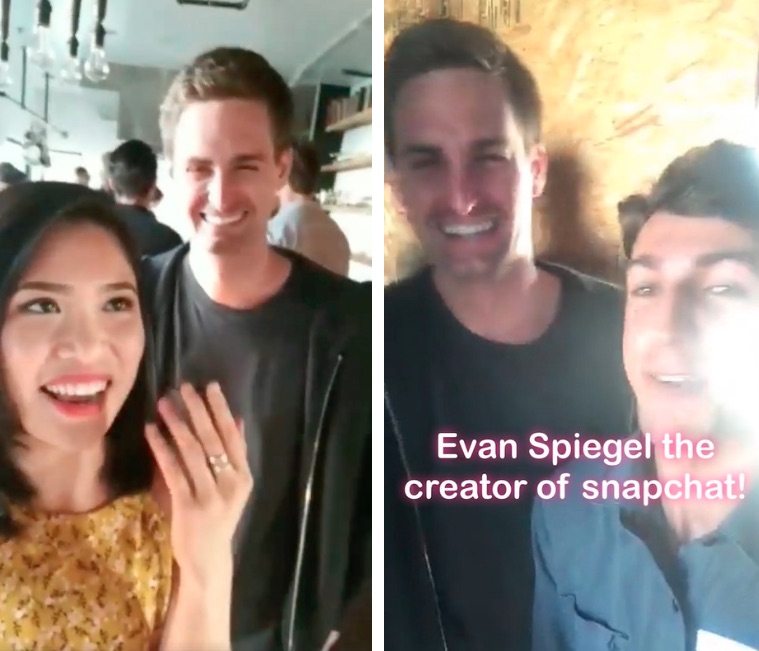‘They genuinely wanted to listen’: Inside the Snapchat Creators Summit where 13 Snapchat users met the boss

Shortly after Cyrene Quiamco arrived at her hotel in the Venice neighborhood in Los Angeles, from her home in Little Rock, Arkansas, a Snap employee welcomed her with a giant yellow boogie board that had “CyreneQ” etched on the front. After admiring that and taking a few snaps, she hung out on the rooftop with a dozen of her friends.
While many hadn’t seen each other in a while, their eyes were glued to their cellphones. It wasn’t because they weren’t entertained. Rather, they were sharing the moments in real time with the millions of people who follow them on Snapchat. Later that night, they celebrated their own celebrity encounter: Snap CEO Evan Spiegel.
“I’m standing right next to the creator of Snapchat,” said Quiamco, as she grinned into her phone, snapping with Spiegel waving next to her.
“This is insane. You gotta say ‘Whattup’ to the Berky squad, ” said Danny Berk, as Spiegel laughed and later said, “Yo.”

Spiegel’s personal Snapchat account may be private, but Snap’s CEO embraced the limelight on his own platform this week during the first Snapchat Creators Summit. The two-day event welcomed 13 people who have dedicated a part of their lives to the app. While Snapchat has brought many of them financial success and celebrity status (in some circles), the company had kept these homegrown stars at bay. As Snapchat strives to compete against Facebook’s Instagram and faces its own slowing user growth, that resistance to embrace influencers has disappeared.
“It wasn’t just all fun and games. We basically said, ‘Most of the people’s views are down. What can you do to help us? We haven’t seen a lot of support.’ They actually had plans, and they got to show a lot of it,” Quiamco said.
The attendees walked in with grievances and came out knowing parts of Snapchat’s product road map, such as parts of the redesign of the redesign that further helped this group be discovered and communicate. Each of them was advised to keep the plans secret so these types of conversations could continue. Snap said it plans to host more Creators Summits.
“They genuinely wanted to listen. I feel very encouraged about what I saw and the direction they are moving. They seem truly committed to making up for lost time,” said Mike Metzler, a Snap influencer and strategist at Delmondo.
Snapchat is on a charm offensive to win the love of influencers. Twitter’s Vine made a similar decision to invite top users into its offices to talk strategy, yet the app died a year later. Recently, Facebook has been making a big push for influencers through Facebook Watch and creator-focused apps. YouTube frequently touts its homegrown talent. Helping that community thrive is one way to attract more users and brand attention.
On Snap’s third-quarter earnings call in 2017, Spiegel said the company would prioritize building “more distribution and monetization opportunities for these creators.” That job has been placed on Nick Bell, Snap’s vp of content. He originally helped create and grow the company’s relationships with publishers through Snapchat Discover. Now, he’s working more closely with individual influencers.
“We feel like there is so much talent on the platform, and as a company, we have not traditionally embraced it. We wanted to listen to the community and figure out how we can make a platform that allows them to tell their really creative and compelling stories,” Bell said.
Spiegel was just one of the highlights within the creators’ Snapchat Stories from the summit. The attendees provided rare looks inside Snapchat’s offices, including the Blue Beach House with its giant version of Snapchat and Snap Map. Some came from elsewhere in LA. Others flew thousands of miles. They each experienced not only a tour of Snap headquarters, but also the city’s recent onset of scooters and the Venice beaches.
From the perspective of viewing the day’s Snapchat Stories, it looked like the attendees are all friends. They are and communicate nearly daily via a “secret Facebook group,” Quiamco said. Yes, they’re aware of the irony — and potential privacy concerns — of using Facebook’s product to talk about Snapchat. Within that group they’ll discuss how much they’re charging brands for particular campaigns and concerns around dropping view counts, for example.
The idea of the summit stemmed from a conversation Bell had with Quiamco when she visited Snap headquarters earlier this year and mentioned the unofficial group. Not long after, Bell invited the 13 Snapchat users to headquarters.
“It was a cheeky remark, where I said, ‘Let’s get everyone together. We’ll tell you what we’re working on. We’ll just get to know you better,’” Bell said. “The key thing for us over the last 24 hours has been to listen. The next step is to digest all of that and figure out what to do with that, and figure out how to prioritize.”

A big part of the summit was acknowledgment. Snap gifted them with a tote bag with a branded towel and flip-flops as well as a boogie board featuring their handles. Of course, there were feature requests and talk of monetization during a roundtable with Bell, Snap’s head of talent relations Lauren Gallo, Quincy Kevan, and other members of the product and engineering teams. One immediate move was to verify the attendees, a feature that improves discoverability and grants access to special features on Snapchat. Quiamco said Snap promised to send them the new version of Spectacles, its video-camera sunglasses.
“We were wondering, ‘Is this going to be all talk and empty promises?’ They have something. I think this was an eye-opener. There’s more faith that Snap is listening,” Quiamco said.
More in Marketing

WTF are tokens?
When someone sends a prompt or receives a response, the system breaks language into small segments. These fragments are tokens.

AI is changing how retailers select tech partners
The quick rise of artificial intelligence-powered tools has reshaped retailers’ process of selecting technology partners for anything from marketing to supply chain to merchandising.

YouTube’s upmarket TV push still runs on mid-funnel DNA
YouTube is balancing wanting to be premium TV, the short-form powerhouse and a creator economy engine all at once.







